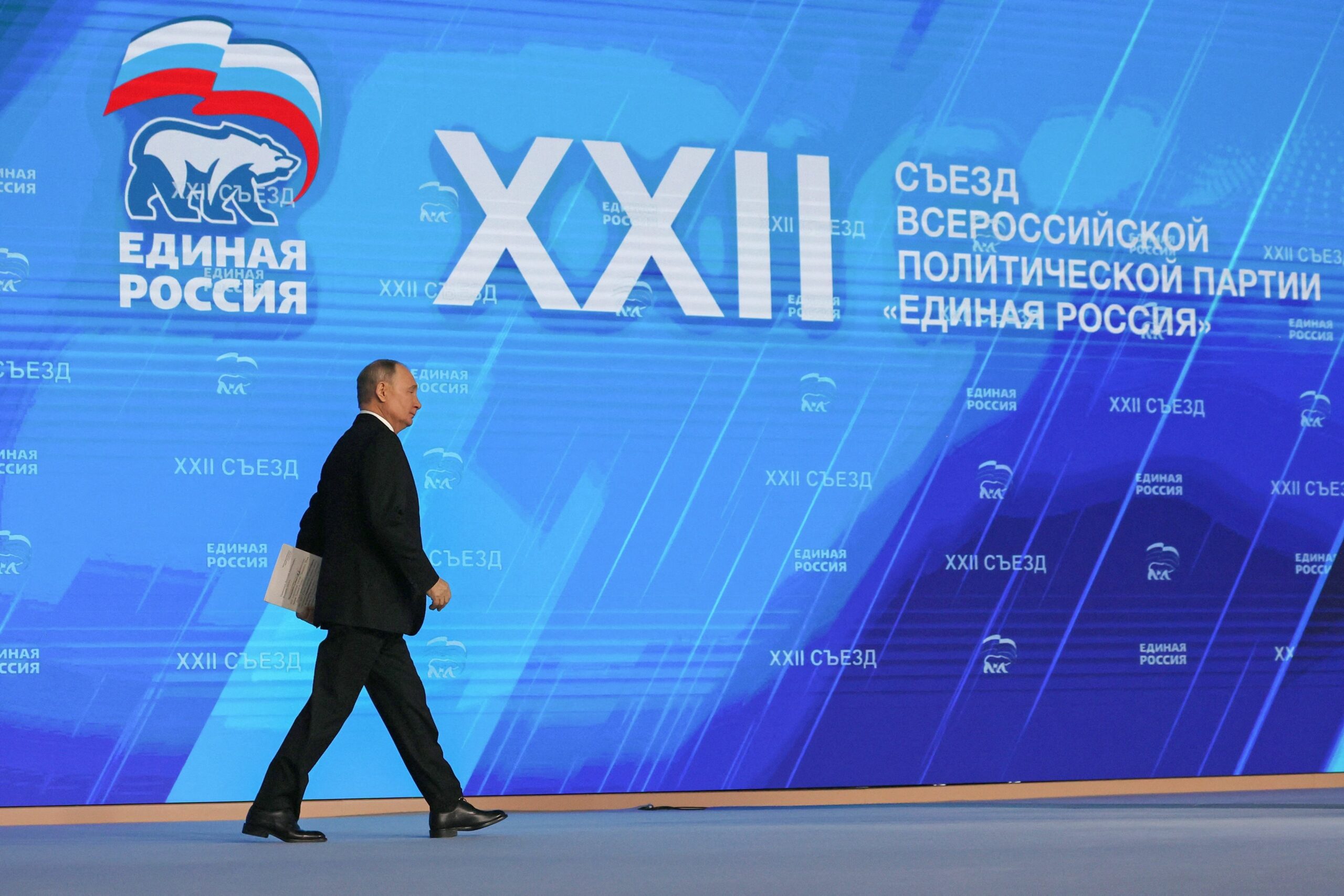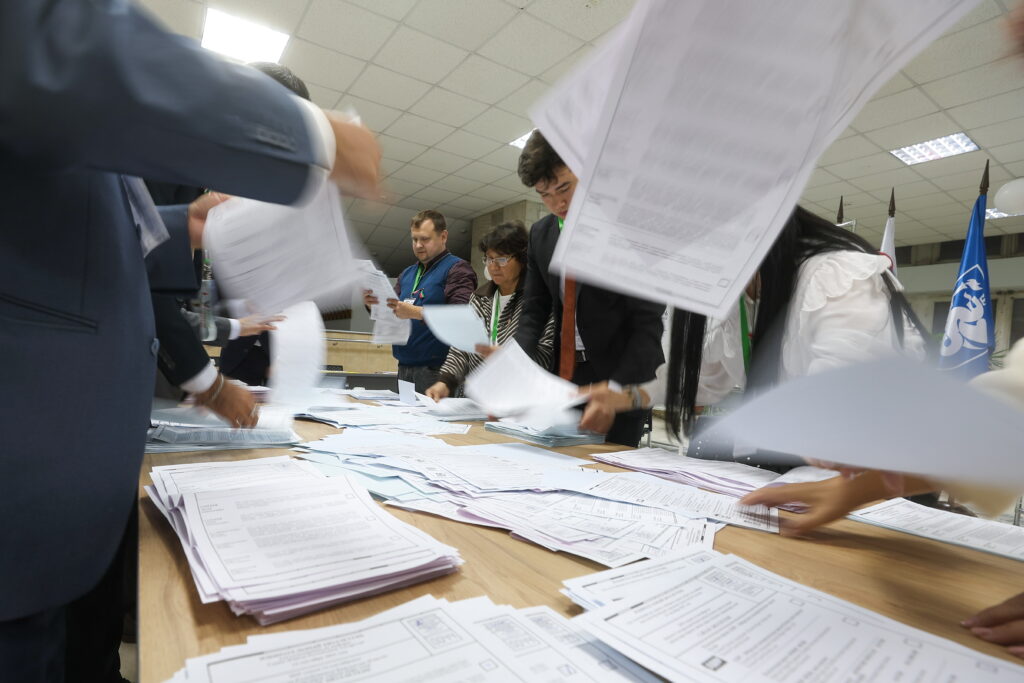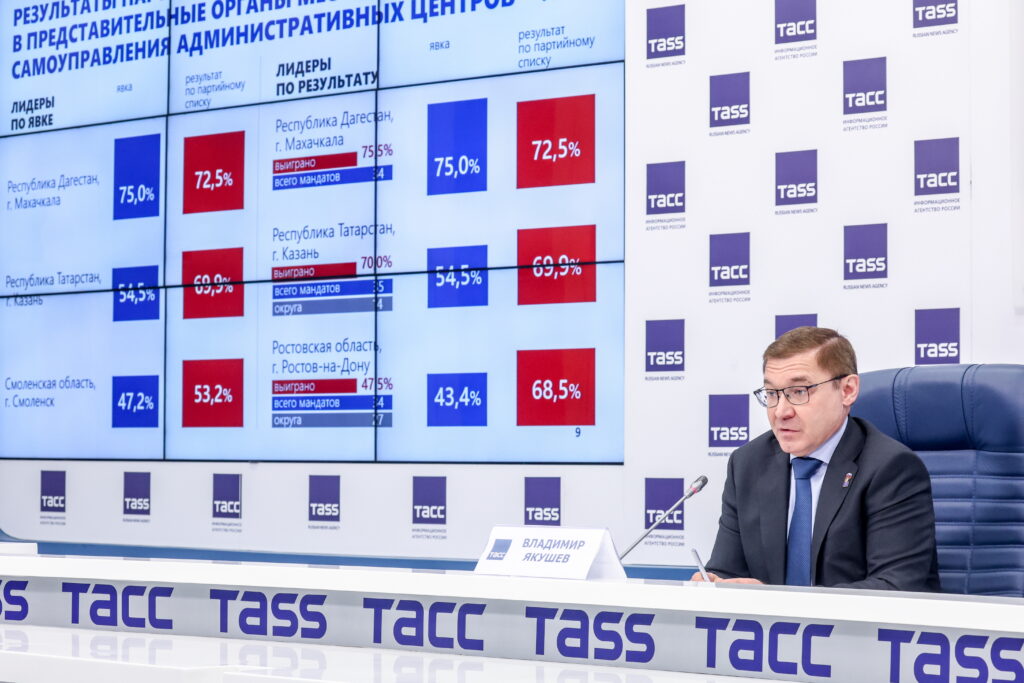The «United Russia» party just held its regular annual congress, where its new operational chief — General Council Secretary Vladimir Yakushev — presented his vision of the party’s management and the outlines of «United Russia”‘s future campaign in the State Duma. The management of «United Russia» will be simplified and verticalized: the number of important positions in the party will be reduced, and most of the current tasks will be carried out by the Executive Committee. From an instrument that helped ensure the loyalty of elites at various levels, the «United Russia» party is morphing into a peripheral bureaucratic structure that simulates «engagement with the public needs».
The problem of the #1
Before the «United Russia» party congress, Vladimir Yakushev, the first deputy speaker of the Federation Council, published an article in Vedomosti that hinted at the general agenda of the congress. The «United Russia» leader called the party «presidential» and said that it helped create the vertical of power. For some time now, both the «United Russia» and the Kremlin have been faced with a non-trivial task. On the one hand, they needed to make sure that Putin is not affected by the low popularity of the ruling party: at its peak in early 2008, support for the «United Russia» party was around 60%, but mostly hovered around the 40−50% level, falling to 33−35% at times of crisis (during the 2011−2012 protests and the 2018 pension reform). At the same time, Putin’s approval rating was 59% at its lowest point. Therefore, the Kremlin made sure not to create too many direct associations and links between the Russian leader and the «United Russia» party. On the other hand, Putin’s supporters needed to be motivated to vote for the «United Russia» so that it could enjoy at least some support. The president appeared at party events and rallies and gave advice on the formation of the party list for the last Duma elections, but he acted like an external, albeit authoritative, observer of the party. Of course, the «United Russia» party is fully controlled and managed by the Kremlin and all its decisions and high-level personnel changes are coordinated with Putin, but this imaginary «detachment» of the president from the ruling party was supposed to prevent the «United Russia» party’s low popularity from affecting Putin himself. The ruling party created a rather paradoxical image: it looked up to the country’s leader, used his quotes in its campaign, but did not receive full reciprocity from him, even though the «United Russia» «bears» would probably have liked to have it. On 14 December, the ruling party came close to getting its wish.
Putin called the party «system-building» and, above all, «our party», i.e. he associated himself with it. This is very important for «United Russia». The ruling party’s ratings are falling: according to VTsIOM, which works with the presidential administration, 44.1% of respondents said they would vote for «United Russia» in the next State Duma elections in January this year, up from 35.5% in December. These figures are a far cry even from the already low Kremlin’s KPI of 55%. This means that the ruling party needs support that will allow it to boost this rating during the election campaign. The «United Russia» party and the presidential administration have only one reliable solution at their disposal: to put Vladimir Putin at the top of the party list. Following the resignation of the «United Russia» party leader Dmitry Medvedev as prime minister, the question of who will head the list for the federal elections has become a problem for the ruling party. The position of Prime Minister could justify Medvedev’s leadership, but the position of Deputy Chairman of the Security Council could not. In the last elections the problem was solved by adding former defence minister Sergey Shoigu and foreign minister Sergey Lavrov to the list. But now Shoigu has fallen out of favor, and Lavrov alone will not be able to make the list work. The foreign minister’s approval rating is 13%, while Shoigu, who has lost media support, has a 3% approval rating. Putin remains the only win-win option for the frontman position on the «United Russia» party list. Putting Prime Minister Mikhail Mishustin at the top of the list would strengthen his position and cast doubt on Dmitry Medvedev’s leadership in the party and this leadership is the last remaining asset that the former prime minister and ex-president has at his disposal. The same will happen if the mayor of Moscow, Sergey Sobyanin, is nominated as the party’s «number one», although he has a relatively low trust rating of 4%, which he can increase with constant publicity. In both cases, the elite will begin to speculate about who the possible successor is, and that is what Putin really fears. The political bloc of the presidential administration will reap the benefits: Putin’s nomination at the top of the list will make the administrative machine work even harder for the «United Russia”‘s result, since it will be the president’s own result.
The new leadership of the party and the political bloc of the presidential administration have clearly worked to incorporate Putin into the ruling party’s agenda. The president was shown a show with speeches by workers, IT professionals and military men (this is roughly how Putin imagines the driving forces of society) and was told about the promotion of the military, which the political bloc and the «United Russia» party are supposed to be involved in. It is likely that this involvement of Putin in the party’s agenda will continue with the help of his favourite issues, and it may end with a solution to the problem of the frontman on the list. From this point of view, the new leadership’s internal personnel policy seems quite logical.
Simplification of management
The «United Russia» party has drastically reduced the number of deputy secretaries of the General Council from a total of six to just one. Vladimir Vasilyev, the leader of the «United Russia”‘s Duma faction, remains Yakushev’s only deputy. Senators Sergey Perminov and Daria Lantratova, deputy chief of staff Alexander Gribov, deputy speaker of the State Duma Anna Kuznetsova and even the head of the «United Russia» party’s central executive committee, Alexander Sidyakin, lost their deputy status. In addition, Perminov, Lantratova and Kuznetsova were excluded from the presidium of the «United Russia» General Council, the main governing body of the «United Russia» party. The Presidium itself was reduced from 35 to 14 members. In addition to Yakushev, Vasilyev, Sidyakin and Gribov, it includes the leader of the Young Guard, Anton Demidov, the head of the Council of Supporters of the «United Russia», Olga Zanko, and eight heads of interregional coordination councils. Such reshuffles make Yakushev to single-handed leader of the party.
It is not worth exaggerating the independence and the breadth of the mandate in the hands of the deputy secretaries of the General Council and the members of its Presidium — all of them were and are part of the power vertical and are ready to meet the whims and demands of the top leadership. However, the posts of deputies and members of the Presidium gave their holders a rather high formal status, opportunities to negotiate with the elites, and some independence. For example, Sergey Perminov was able to co-operate with governors on personnel issues, nomination of candidates for elections in his previous capacity as deputy secretary, and some of these issues did not require coordination with the top party and Kremlin leadership. Perminov remained the supervisor of elections, but he lost his status and, albeit relative, freedom of action. The same can be said about Darya Lantratova, who oversees information policy issues. Both Perminov and Lantratova were oriented towards influential figures in the power vertical: the former towards the political bloc of the presidential administration and the Kovalchuk brothers, the latter towards Alexey Gromov, first deputy head of the presidential administration and supervisor of the Kremlin’s information bloc. The demotion will force Perminov and Lantratova to coordinate even the minor initiatives with Yakushev.
The new general secretary, as a person who has spent his entire career as a civil servant with very superficial and indirect relationship to real public policy, has clearly decided to build his own power vertical within the «United Russia» party, based on the specific structures he knows well (first and foremost the party’s executive committee) and patterns of direct subordination. The reduction in the number of deputies and members of the Presidium will facilitate the passage of most issues through the Executive Committee, excluding the participation of other figures in its decisions. However, Yakushev has not yet appointed his own protegé to head this structure, although the former head of the Tambov region, Maxim Egorov (he used to work with Yakushev in the federal construction ministry), was vying for the position. So far, the new General Secretary’s people have only appeared in the Executive Committee at the level of deputies to its head. The committee continues to be headed by State Duma deputy Alexander Sidyakin. Probably no compensatory position has yet been found for him — the Kremlin has no obvious complaints about his work, and firing such a person without offering him another job would violate the unspoken rules of the power vertical. Judging by Vladimir Yakushev’s public statements about him putting his main focus on the executive committee, his man will inevitably emerge at the top of this structure. So far, a rather informal circle of influence is forming around the General Secretary: his people are by his side. For example, his closest associate Tatyana Kostareva (who was Yakushev’s deputy in the construction ministry and in his envoy office) now works as his chief of staff in the Federation Council.
Of course, the «United Russia» could not help but perform the ritual of including «war veterans» who participated in the fighting against Ukraine in the party’s governing bodies, but so far, as in the case of the introduction of the military into the bureaucratic facet of governance, it looks like a simulation rather than a real thing. Firstly, there are rather high-ranking officials among those who came from the trenches, for example, State Duma deputy Dmitry Sablin and the head of the Nizhny Novgorod garrison, Yevgeny Chintsov. Secondly, military men were delegated for the Supreme and General Councils of the party, along with the heads of the party’s rural branches and status budget workers, and dissolved into them.
The logic of simplification
The «United Russia» party is rapidly losing the remaining features that made it look like a real party (or at least a quasi-party) and turning into an extremely bureaucratized and verticalized state structure. In the early 2000s, the «United Russia» party was conceived by the Kremlin’s political bloc as a project that could accommodate the majority of elites in the broadest sense of the word. It invited delegates from large federal companies, local businessmen, status bureaucrats and politicians (even from parties then in opposition to the Kremlin: Irina Yarovaya was a member of «Yabloko», for example). There were enough jobs for everyone, and internal competition for higher positions was even encouraged. In the middle of 2000s, for example, representatives of different groups competed for influence in the party: the head of the General Council, Vyacheslav Volodin, who was close to Moscow mayor Yuri Luzhkov and former prime minister Yevgeny Primakov, and a representative of Sergey Shoigu’s clan and head of the Executive Committee, Andrey Vorobyov. At the regional level, the party could allocate various posts to local actors: branch head, speaker of the regional assembly, speaker of the regional central council, etc. All this not only gave them formal status, but also allowed them to participate in decision-making. In this way, the Kremlin drew the elites into the vertical and maintained their loyalty. Over time, the power vertical became increasingly rigid, and the war only accelerated this process. Even before the full-scale invasion of Ukraine, those traces of liberalism within the «United Russia» party were gone: regional governors took over as leaders of most of its branches.
In this sense, the arrival of Vladimir Yakushev as head of the General Council is logical. He is a bureaucrat who comes from the management team of Moscow mayor Sergey Sobyanin. Yakushev was Sobyanin’s deputy, when Sobyanin was governor of the Tyumen region in the early 2000s, then head of that region, federal construction minister and, until recently, presidential envoy to the Urals. Sobyanin’s team knows how to simplify processes and structures in the interests of vertical integration. More than 20 years ago, for example, it ogranized the process of cancelling mayoral elections in the Tyumen Oblast — a move the Kremlin could only begin to dream of at the time. The political crisis in the 2019 Moscow City Duma elections, which ended with the opposition winning 20 out of 45 single-mandate districts, also did not involve complex decisions. Instead of carefully selecting candidates that would represent the regime, the city administration introduced electronic voting, which was in no way monitored by observers. This system made it possible to declare such controversial figures as TV expert and ultra-patriot Anatoly Wasserman (2021 Duma elections) or pop singer Oleg Gazmanov’s son Rodion (2024 Moscow City Duma elections) as the official winners of the elections.
Vladimir Yakushev is taking a similar approach in the «United Russia». Not only is he bringing his own people into the party leadership, but he is also changing the principles of its organization — reducing the number of positions that had any influence of their own, making everybody accountable to him and him alone. This policy will make it increasingly difficult for people who are ambitious but loyal to the system to make a career in the party. Only the current party leadership and people who already have significant political weight will have enough prominent positions within the «United Russia». Such a structure is easy to manage; it will be based on governors heading branches, i.e. an administrative vertical of power. If Vladimir Putin heads the UR list, the circle of bureaucratization of the «bears» will finally close — the entire administrative machine has long been working for the president, so the party that nominated him to head its list has no choice but to fit into this machinery as a cog.
The «United Russia» party could never be considered a full-fledged party, but it worked well as a tool to ensure the representation of elites at various levels and to distribute status. Now the «United Russia» party is becoming an organizational structure for nominating candidates for various power bodies — people with no particular political ambitions, or MPs who have long since become agents of the interests of the presidential administration or the government. The ruling party, as well as the power vertical as a whole, is finally losing its flexibility. It is very easy for the Kremlin managers to control such simplified systems, but they only work smoothly until a crisis occurs. In the event of a crisis, the players excluded from the party elite and the decision-making process are unlikely to help the system survive.










